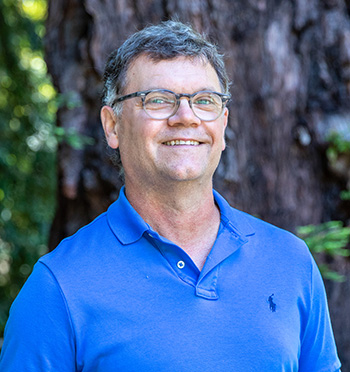Campus News
NIH grant funds research on a powerful new approach to drug development
A new NIH MIRA grant funds biochemist Scott Lokey’s efforts to develop complex, membrane-permeable molecules as next-generation therapeutic agents.

Scott Lokey, professor of chemistry and biochemistry at UC Santa Cruz, has received a $1.8 million grant from the Maximizing Investigators’ Research Award (MIRA) program of the National Institute for General Medical Science (NIGMS). The prestigious five-year grant provides flexible, long-term funding for Lokey’s research program, which focuses on designing novel compounds that can hit disease-related targets that have been considered “undruggable.”
Many successful drugs are small molecules that can readily cross biological membranes—they can be taken orally and cross the gut wall into the circulation, and then they can cross cell membranes and bind to molecular targets inside cells, blocking or otherwise altering the activity of the target molecule. Many disease-related targets, however, don’t have the kinds of binding sites that allow small molecules to interact effectively with them.
“There is a whole class of undruggable targets, which means they are not easily inhibited or blocked by typical small-molecule drugs,” Lokey explained.
His lab has spent years studying how some larger molecules are able to get across cell membranes and working out the rules that govern membrane permeability. The new grant will support a long-term research program to apply these rules of membrane permeability to the development of novel therapeutic agents.
“This work was inspired by natural products, many of which do cross membranes and hit targets inside the cell despite being large molecules,” Lokey said. “If we can mimic that in synthetic molecules, maybe we can actually design membrane-permeable drugs to hit undruggable targets.”
Lokey’s lab has been focusing on one class of molecules called macrocyclic peptides. Macrocyclic peptides found in nature are a diverse group of compounds, many of which have drug-like properties. Known as “molecular chameleons,” they adopt different shapes depending on their environment, which enables some of them to cross cell membranes. They are also relatively straightforward to synthesize in the lab, enabling researchers to create a wide variety of novel compounds for testing.
“They’re very modular, so we can mix and match building blocks to generate enormous complexity and diversity for relatively little investment in terms of synthetic chemistry,” Lokey said. “We can make millions and billions of different macrocyclic peptides using the same repetitive chemistry.”
His lab has created a library of synthetic macrocyclic peptides and has already begun screening them for activity against certain types of cancer cells and other targets being studied by colleagues at UC Santa Cruz. Lokey, who directs the UCSC Chemical Screening Center, said his program is taking advantage of recent developments in screening technology that are making it easier to screen extremely large libraries of compounds. Called DNA-encoded library technology, it involves attaching a DNA “barcode” to each compound, making it easier to track and identify active compounds through the screening process.
“Ultimately, we want to use the targets we’re going after now as a proof of concept to demonstrate that this class of compounds has as much power as we think it does,” he said. “I really believe this could be a general approach to find leads against any undruggable target.”